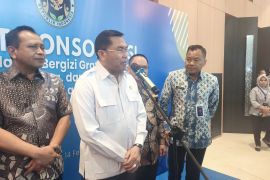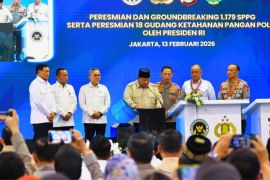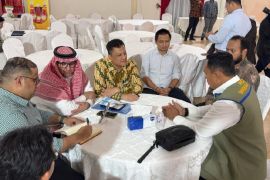B2P2TOOT, which is located in Tawangmangu, Karanganyar District, Central Java, will no longer conduct research on traditional medicines, as its research function will be handed over to the National Research and Innovation Agency (BRIN).
Currently, the center is transitioning toward providing traditional health services, such as wellness tourism, education, testing services, and providing herbal and traditional medicines.
It is offering traditional health services to patients, with the B2P2TOOT clinic using different products than conventional clinics, namely traditional herbal medicines.
Given the huge potential in Tawangmangu for nature, culture, culinary, and religious tourism, among others, there is scope for B2P2TOOT to provide wellness tourism, under which domestic and foreign tourists will be able to avail its services to improve their fitness, mental health, and spiritual well-being.
Tawangmangu’s medicinal herb garden, jamu (Indonesian traditional herbal medicine), fresh mountain air, and yoga, can refresh the mind and offer a break from the trials and travails of city life.
Further, B2P2TOOT will also offer educational tourism where tourists will get to learn about medicinal plants and their benefits.
In addition, it has a laboratory where testing services can be carried out, supported by quality tools and human resources. Thus, visitors will even be able to test medicinal plants to determine their chemical composition.
Ristoja
The B2P2TOOT, under the auspices of the Health Ministry, has studied local knowledge of ethnomedicine, which refers to a comparison of traditional drugs and herbal medicines (ristoja).
The agency has also conducted research on post-harvest medicinal plants at the upstream level, phytochemical screening at the middle level, and preclinical use, clinics, formulations, and certification at the downstream level.
The B2P2TOOT has obtained 32,014 data points on jamu ingredients and potions from various regions and 400 tribes across the country.
However, the data is still basic and requires further substantiation, specifically whether herbal plants can cure certain diseases as people have used them from generation to generation.
The B2P2TOOT could work with the National Research and Innovation Agency (BRIN), universities, and hospitals to carry out an in-depth study on this.
Meanwhile, in terms of herbal plant cultivation, the agency has succeeded in recommending a local variety of stevia, a plant that has sweet compounds.
The recommendation was submitted to the Karanganyar district head and was followed by the agriculture office registering it with the Ministry of Agriculture, with Karanganyar obtaining the naming rights for the local variety of stevia.
The agency has also produced 12 scientific jamu potions and examined their safety and efficacy. The final result showed that they are safe, have high quality, and are efficacious.
The 12 scientific jamu potions are said to help treat gout, high blood pressure, hemorrhoids, arthritis, cholesterol, liver function disorders, ulcers, bladder stones, diabetes, obesity, and increase breast milk production.
"The 12 jamu potions can overcome the 12 diseases, and they have been declared safe and efficacious because they have gone through clinical trials," head of B2P2TOOT, Akhmad Saikhu, said.
The Jamu Scientification Clinic "Hortus Medicus" has been implemented based on Ministerial Regulation No. 003 of 2010 on jamu scientification in health service-based research, which seeks to ensure that jamu concoctions are safe, of high quality, and efficacious.
Scientification is a research approach for determining herbal medicines' efficacy with the help of scientific evidence.
Established in 2007, the clinic has supporting human resources consisting of eight doctors, three pharmacists, nine Pharmacy D3 (three-year diploma) graduates, five nurses, two health analysts, three medical record officers, and one nutritionist.
Patients who come to the clinic for a consultation are prescribed traditional herbal drugs.
Many of the patients come from districts and cities, such as Greater Solo, Central Java, and Magetan, Madiun, Ponorogo, and Kediri, East Java. The condition of one patient who suffered from bladder stones has improved ever since he was prescribed a jamu potion, which needed to be consumed thrice a day.
Before the COVID-19 pandemic, the average number of patients at the clinic could reach 120 per day. The number dropped to 20 patients per day during the pandemic, with consultations conducted solely through the online telemedicine service.
After the pandemic situation improved, the clinic reopened on-site services in December 2021 and the patient visits revived to around 50 per day.
Wellness tourism
The center is offering wellness tourism at an affordable rate, ranging from Rp2 thousand to Rp5 thousand.
Tourists visiting the center can visit the garden, the laboratory, the clinic, and the jamu store. They can also visit the aromatic garden with beautiful views of Mount Lawu in Tlogodlingo, Karanganyar, which nourish the soul and refresh the body.
The garden has a separate area for growing medicinal plants, a greenhouse, a nursery, and a tea garden, among other things.
The staff introduce visitors to herbal plants that can contribute to human health even in the next generation.
Before the COVID-19 pandemic, the number of visitors to the wellness tourism garden averaged ten thousand per year, but due to pandemic restrictions, the figure dropped drastically to about one thousand per year. However, as of August 2022, the number of visits has improved to five thousand.
The B2P2TOOT management is optimistic that both patient and tourist visits will increase so that more people can become familiar with medicinal plants and use them for improving their health.
Related news: Need to intensify phytopharmaca research, development: BRIN
Related news: BPOM supplies jamu, thematic cosmetic products in tourism destinations
Editor: Rahmad Nasution
Copyright © ANTARA 2022












